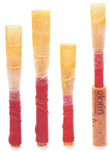|
DOUBLE REED DISORDER

'With most reverent and obsequious apologies to all them that are heavy-laden with bassoon and shall find not rest, herein', by JENNIFER PAULL
Oboe reeds are a lot like golf clubs -- highly calibrated tools of the trade where the difference between world-class performance and embarrassing disaster is measured in millimeters. -- Donald Baker, Principal Oboe, Detroit Symphony Orchestra, Detroit Free Press, 15 February 1998
The oboe, unlike any other instrument, turns those of us who play it into carpenters. We all suffer from the recently diagnosed, Double Reed Disorder and belong to National and/or International Societies of fellow-sufferers. Congresses are hosted annually and Double Reed Days are organised in many countries: from Finland to Australia, Germany to Japan. Remedies are exchanged freely upon heated listservs where flame wars are de rigeur. Bassoonists join in everything too, attempting to boast a certain degree of 'normalcy' (an utterly questionable hypothesis); an oxymoron if ever there was one!
Of course, the aforementioned claim that the two blades of cane (the 'double reed'), which vibrate against each other inside the mouth (to make the sound), are an uphill (up-crook) climb, indeed. Oboists find that droll to a side-split. The finished bassoon reed can last for several weeks if not months. Our fragile model may survive a concert or a day (with a good tail wind), having an inbuilt, butterfly lifespan.

Oboe family reeds
|
It becomes geriatric (often in mid-Mahler) and kicks the reed bucket, thence to be kept neatly aligned with erstwhile, fellow stiffs inside a reed box. The latter, mostly designed to host twelve good reeds and true, generally only boasts one or two in working order. It serves therefore, as a portable coffin or mobile, family crypt.

Reed boxes
|
A British manufacturer once advertised a reed box for sixty with 'go on, amaze your friends', encouragingly slotted alongside their catalogue illustration. Here we have the ex-colonial touch -- a St Paul's vault, or rather a personal Canterbury Cathedral Cemetery. Mummified reeds in a reverend row exude memories of when they once lived and died and had their being. They bring 'good luck' by their ghostly presence to the long-suffering oboist, who is a superstitious creature: nervous and understandably so, but never a denture wearer.
Doublereeddom is a denture-free zone. Attempting the magnificent bassoon solo con dentiere at the beginning of The Rite of Spring (for which the World Pole Vaulting Record is forever held honoris causa by our recently regretted and much loved, Gwydion Brooke) would be far more risky than playing Russian roulette. The Silken Ladder by Rossini, already a tonguing nightmare for the oboist, would become a denture trill. Now why didn't John Cage think of that?
The crook (or bocal) is that bit of plumbing between the larger oboes (d'amore, cor anglais or bass), the bassoon (or contra) and the double reed itself. It is as vital and varying in quality as the bow for string instruments: works of art or works of woe. Crooks carry the vibrations from the mouth to the instrument and often equate to the refinement (if not the circumference) of the equivalent length of vacuum cleaner hose. There exist one or two garrets of invaluable artisans on this planet, hand-making treasures in silver and gold -- starving to death with full merit due, in as non-commercial a market as one could possibly imagine. The hand-made lace con hand-painted, carved-ivory, folding-strut, fan trade is equally narrow however, I am knowledgably informed. Many instrument manufacturers do appear to cherish close ties with vacuum cleaner technology and engineering; judging by the merit of the habitual brace of crooks in situ in the instrument case upon purchase. They nestle into velvet linings as though cunningly receiving smoothness and noblesse via presentational osmosis. Never be fooled by a luxurious display or by a well-known brand name! Labels and packaging do not a crook make (nor an empty box, a reed)! One is given a selection from which to choose (a vital investment), should one opt to fly to the manufacturer's showrooms for the privilege -- Hoover, Electrolux, Suquitall, Puphalotte, etc.

Arundo Donax
|
Made from the arundo donax variety of cane, reeds are the bane of every oboist's existence and are h(er/is) omnipresent delinquents, to boot the bocal. After all, what else can one expect, when a superfluity of worthless crooks abound? Quod erat demonstrandum!
Continue >>
Copyright © 30 July 2005
Jennifer I Paull, Vouvry, Switzerland

|

